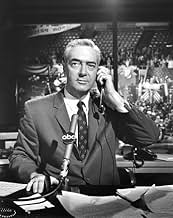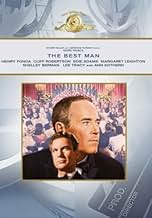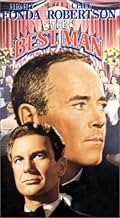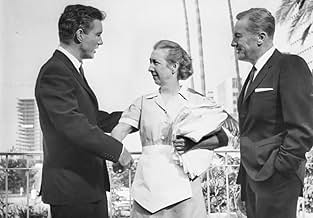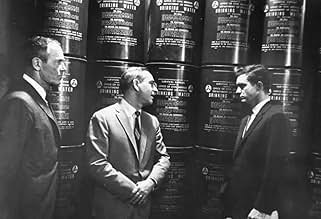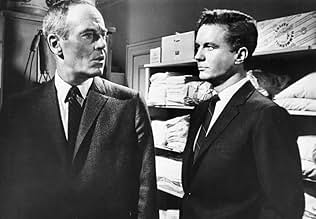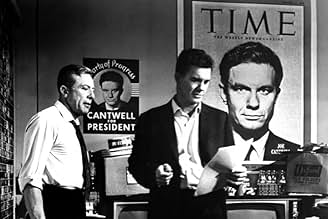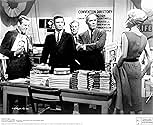VALUTAZIONE IMDb
7,6/10
4024
LA TUA VALUTAZIONE
Aggiungi una trama nella tua linguaThe two front runners for their party's presidential nomination, one principled and the other ruthless, vie for the former president's endorsement.The two front runners for their party's presidential nomination, one principled and the other ruthless, vie for the former president's endorsement.The two front runners for their party's presidential nomination, one principled and the other ruthless, vie for the former president's endorsement.
- Candidato a 1 Oscar
- 1 vittoria e 5 candidature totali
Penny Singleton
- Mrs. Claypoole
- (scene tagliate)
Anne Newman Bacal
- Janet
- (as Anne Newman)
Recensioni in evidenza
60's flick about political mudslinging between two candidates who are vying for their party's nomination for president. The action takes place at the convention as both Henry Fonda and Cliff Robertson dig up the dirt about each other. Compared to today's politics this 64 film actually seems tame. Fun to watch especially during a presidential election year.
In a Presidential convention, William Russell (Henry Fonda) and Joe Cantwell (Cliff Robertson) are the leading candidates. Russell is a principled intellectual with personal issues that could haunt him. His estranged wife Alice is supportive publicly. Cantwell is a populist on the outside, and a ruthless opportunist on the inside. His wife is superficial. They struggle for the endorsement of the departing President Art Hockstader. Cantwell threatens to Hockstader that he would release Russell's secret psychiatric hospital records. In his all important speech, Hockstader doesn't give a direct endorsement throwing the convention open. He has concerns about Russell but vows to stop Cantwell.
This is a political movie of the era. The main characters are referencing politicians of the time. It loses a little with the passage of time. Fonda and Robertson are exceptional. Writer Gore Vidal injects the movie with plenty of behind the scenes realism. It is more real than most political thrillers of that era.
This is a political movie of the era. The main characters are referencing politicians of the time. It loses a little with the passage of time. Fonda and Robertson are exceptional. Writer Gore Vidal injects the movie with plenty of behind the scenes realism. It is more real than most political thrillers of that era.
The Best Man in a sense was dated before it ended its Broadway run of 520 performances in the 1960-1961 season. John F. Kennedy with his string of primary victories had the nomination almost decided before the Democrats met in Los Angeles that year to nominate him. After that, money raised and spent wisely in primaries decided nominations in both parties long before the conventions met. The last convention where there was a semblance of a contest was the 1976 Republican convention where it was not certain until the balloting that Gerald R. Ford would be the GOP candidate.
This film takes us back to the era of the smoke filled room although candidate Cliff Robertson pointedly tells former president Lee Tracy that he does not smoke. We've got two candidates at this fictional Democratic convention circa the sixties. One is Henry Fonda former Secretary of State, an intellectual in politics modeled on Adlai E. Stevenson and Cliff Robertson a no nonsense street fighter of a U.S. Senator that Joe McCarthy was the prototype.
By the way back in those days Joe McCarthy could easily have been a Democrat. Note that Robertson has the support of the lily white south in the era before the civil rights revolution. Minor candidate John Henry Faulk, a southern governor, is most concerned about mandated integration of his state's public schools. Back then the Dixie part of this country had a big influence in the Democratic party, the Republicans were almost moribund in many southern states. But they were a growing force.
Neither Fonda or Robertson really understands the motivations of the other. They're both courting the support of Lee Tracy a former Truman like president. In actual fact, Truman counted for very little once he was out of the White House. He anointed no successor in 1952 and in 1956 and 1960 his candidates were W. Averill Harriman and Stuart Symington respectively and both came up very short.
Fonda and Robertson both have dirt of varying degrees on the other. Fonda's dirt is supplied by former army buddy of Robertson's Shelley Berman who says that Robertson was gay. As it turns out Robertson ratted out a bunch of gay men in the service and got smeared in retaliation with the label. That sad to say has not changed even with don't ask don't tell in the Defense Department.
Fonda and Robertson's roles on Broadway were played by Melvyn Douglas and Frank Lovejoy. Lee Tracy who was the only carry over from Broadway, won a Tony Award and was nominated for an Oscar, but lost to Peter Ustinov for Topkapi. Tracy's is a finely etched portrayal of a bitter old man now out of real power and seeing his power to control events slipping by. Made even more bitter by the fact that he reads the characters of Fonda and Robertson very well, but can't influence either.
Gore Vidal aided in the transition of his play to the screen and it survived the journey from Broadway none the worse for wear. It's a fascinating look at a bygone era of politics when the national conventions meant something as opposed to being the media shows they are today.
In which we hope then as now that The Best Man will win out.
This film takes us back to the era of the smoke filled room although candidate Cliff Robertson pointedly tells former president Lee Tracy that he does not smoke. We've got two candidates at this fictional Democratic convention circa the sixties. One is Henry Fonda former Secretary of State, an intellectual in politics modeled on Adlai E. Stevenson and Cliff Robertson a no nonsense street fighter of a U.S. Senator that Joe McCarthy was the prototype.
By the way back in those days Joe McCarthy could easily have been a Democrat. Note that Robertson has the support of the lily white south in the era before the civil rights revolution. Minor candidate John Henry Faulk, a southern governor, is most concerned about mandated integration of his state's public schools. Back then the Dixie part of this country had a big influence in the Democratic party, the Republicans were almost moribund in many southern states. But they were a growing force.
Neither Fonda or Robertson really understands the motivations of the other. They're both courting the support of Lee Tracy a former Truman like president. In actual fact, Truman counted for very little once he was out of the White House. He anointed no successor in 1952 and in 1956 and 1960 his candidates were W. Averill Harriman and Stuart Symington respectively and both came up very short.
Fonda and Robertson both have dirt of varying degrees on the other. Fonda's dirt is supplied by former army buddy of Robertson's Shelley Berman who says that Robertson was gay. As it turns out Robertson ratted out a bunch of gay men in the service and got smeared in retaliation with the label. That sad to say has not changed even with don't ask don't tell in the Defense Department.
Fonda and Robertson's roles on Broadway were played by Melvyn Douglas and Frank Lovejoy. Lee Tracy who was the only carry over from Broadway, won a Tony Award and was nominated for an Oscar, but lost to Peter Ustinov for Topkapi. Tracy's is a finely etched portrayal of a bitter old man now out of real power and seeing his power to control events slipping by. Made even more bitter by the fact that he reads the characters of Fonda and Robertson very well, but can't influence either.
Gore Vidal aided in the transition of his play to the screen and it survived the journey from Broadway none the worse for wear. It's a fascinating look at a bygone era of politics when the national conventions meant something as opposed to being the media shows they are today.
In which we hope then as now that The Best Man will win out.
A sharp as nails look at US politics, maybe a bit old fashioned, but in a good way, with great performances and writing, and very well put together. It pits the packaged candidate of "the people", a scary Cliff Robertson against the principled liberal played by Henry Fonda, with Lee Tracy as the dying ex-president whose endorsement both vie for. While he favors Robertson for his decisiveness, he fears his utter lack of principles, but can't support the wavering Fonda. Sex, mental illness, shady characters dredged up by political operatives (in this case a great part by Shelley Berman), the fabulous portrayals of both of the wives (especially a cute and dangerous Edie Adams), the film transcends the characters, and hits home as much today as when it came out in 1964.
Two men vie for the presidential nomination of a party. Based on a play by Vidal, this is a fascinating behind-the-scenes look at the political machinations on the campaign trail. Although the name of the party is not identified in the film, the candidates display elements of both Democratic and Republican values. Fonda is the decent, old-school liberal while Robertson is his ruthless, right-leaning rival. Both turn in excellent performances. The standout in the fine supporting cast is Tracy as a former president who must decide which candidate to endorse. This is an ideal companion piece to "Advise and Consent," made a couple of years earlier and also starring Fonda.
Lo sapevi?
- QuizLegend suggests that the future Republican American President Ronald Reagan, late in his previous career as a Hollywood actor, was rejected for a role in this film because a studio executive at United Artists didn't think he had "that presidential look". However, Gore Vidal, in one of his several essays attacking Reagan's presidency, says that Reagan was actually considered for the role of Joe Cantwell during preparations for the first Broadway production of his original play in 1960. (Frank Lovejoy eventually played Cantwell on stage). 1964, the year the film version appeared, was the year Reagan decisively left acting for politics, so Vidal's version of the story is the more likely.
- BlooperDuring the roll call, the chairman of the Pennsylvania delegation begins his announcement by saying "Mr Chairman, the State of Pennsylvania....". Pennsylvania is actually a Commonwealth, and any leading politician would refer to it as such.
- Citazioni
Joe Cantwell: I don't understand you.
William Russell: I know you don't. Because you have no sense of responsibility toward anybody or anything. And that is a tragedy in a man, and it is a disaster in a president.
- Curiosità sui creditiDuring the opening credits, a picture of every single U.S. President appears in order, from George Washington to Lyndon Johnson.
- ConnessioniFeatured in AFI Life Achievement Award: A Tribute to Henry Fonda (1978)
I più visti
Accedi per valutare e creare un elenco di titoli salvati per ottenere consigli personalizzati
- How long is The Best Man?Powered by Alexa
Dettagli
- Tempo di esecuzione1 ora 42 minuti
- Colore
- Proporzioni
- 1.66 : 1
Contribuisci a questa pagina
Suggerisci una modifica o aggiungi i contenuti mancanti

Divario superiore
By what name was L'amaro sapore del potere (1964) officially released in India in English?
Rispondi

